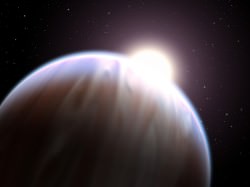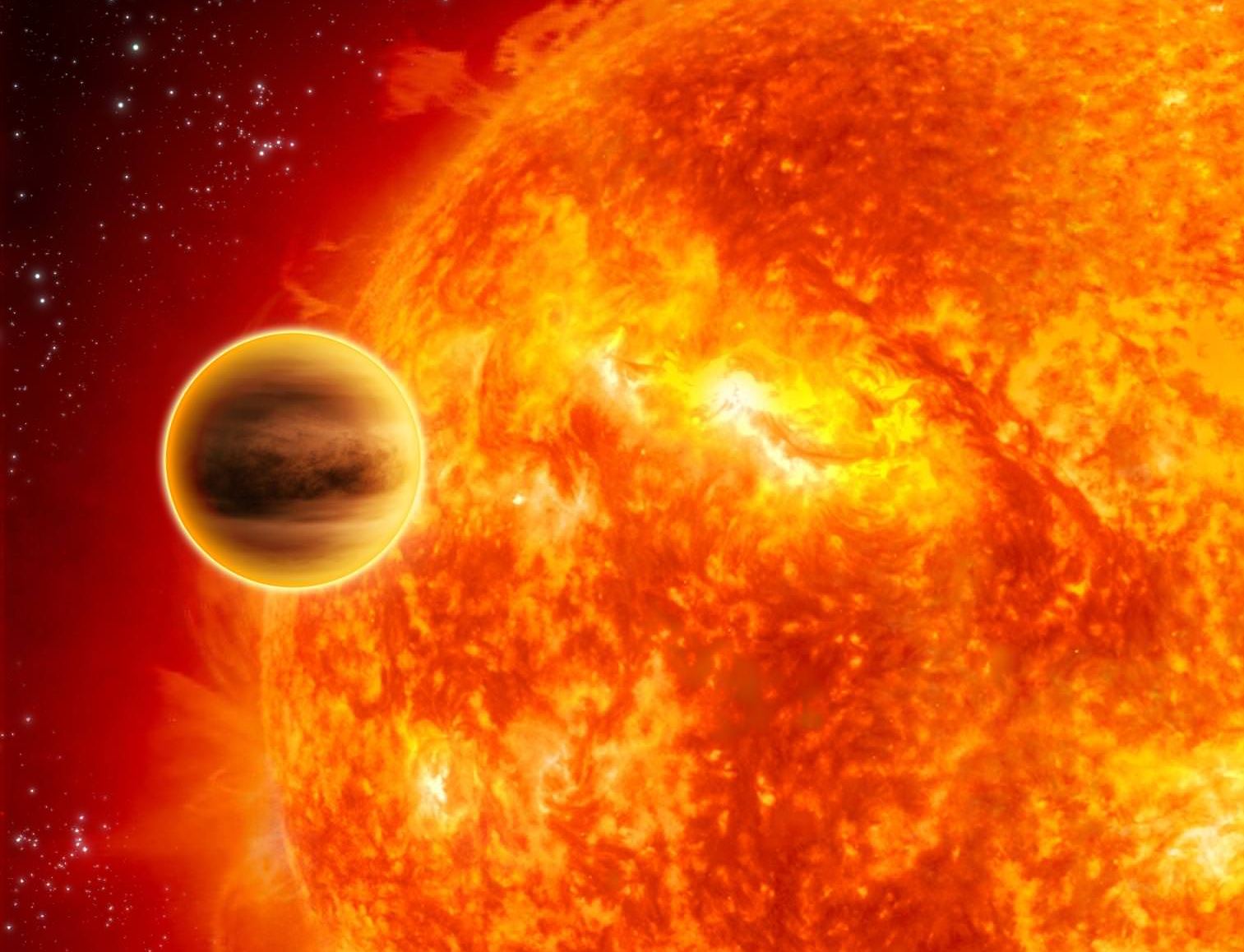With exoplanet discoveries coming at us several times a month, finding these worlds is a hot field of research. Once the planets are found and confirmed, however, there’s a lot more that has to be done to understand them. What are they made of? How habitable are they? What are their atmospheres like? These are questions we are only beginning to understand.
One long-standing exoplanet researcher argues that we don’t know very much about about alien planet atmospheres, as an example. Princeton University’s Adam Burrows says that not only is our understanding at an infancy, but the media and scientists overhype information based on very little data.
“Exoplanet research is in a period of productive fermentation that implies we’re doing something new that will indeed mature,” Burrows stated in a story posted on Princeton Journal Watch. “Our observations just aren’t yet of a quality that is good enough to draw the conclusions we want to draw.”

Burrow’s skepticism comes from how information on exoplanet atmospheres is collected. That uses a method called low-resolution photometry, which shows changes in light and radiation emitted from an object such as a planet. This could be affected by things such as a planet’s rotation and cloud cover.
Burrows’ solution is to use spectrometry, which can glean physical information through looking at light spectra, but that would be a challenge given the existing exoplanet-seeking infrastructure in space and on Earth uses telescopes that generally rely on other methods.
What do you think of his conclusions? Leave your thoughts in the comments. For more information, read the full article in Princeton Journal Watch, the study in Proceedings of the National Academy or the preprint version on Arxiv.


What’s wrong with a little excitement over exoplanet details? Sure, they’re preliminary, but research will continue and the profiles will be polished up as time goes on and more advanced technology comes into play. Speculation in this case just serves to get the public excited about the possibilities of other worlds and how much they may be different from — or similar to — what we’re used to here on Earth. It’s better than not saying anything at all, I think.
I think Burrows is overly concerned about a fairly minor issue. Sure, I get that he doesn’t want the field of exoplanetary studies to be overrun with unrealistic expectations and hype, but I don’t think that’s what is currently happening. The world is transfixed on each new alien world that we discover, and every little detail is a revelation. To a scientist who has committed years or decades into searching for extrasolar worlds, the exo-excitement the public and media ooze may seem premature, but I think on the whole, the science media coverage has been sound and the public is very realistic as to the limitations. The tabloid press will always be full of superlatives and some outlets will continue to misunderstand the difference between “Earth-like” and “Earth-size”, but these minor missteps are eclipsed by the public’s enthusiasm for the voyage of discovery we are on. So long as the science media ensure accuracy in their reporting on exoplanet studies, I see nothing wrong with treating every new alien world as a fascinating, unique and compelling find that ignites people’s imagination and their fascination for space. I would NEVER want to see each new exoplanet discovery as simply a +1 to the exoplanet count — no one would be excited about an alien world “bean counter.”
The media “overhype information based on very little data.” Oh my! Say it isn’t so!
LMAO!
Sounds reasonable, considering exoplanet atmospheres only register as very small perturbations of very small perturbations.
I agree with Jason! Getting science and astronomy into the main stream is a good thang… this webpage proves it! As does the internet in general for those who choose to use it for selectively filtering through the knowledge base. Filter is the keyword here.. MSM tends to sensationalize, which has become rather boring and tedious. Predictable and obscene? How about down right RUDE? How about those endless strategically placed commercials….Eh!?
MSTV~ Dzzzz…. Is evidence of the vacuous wasteland created by our consumeristic tendencies. Hundreds of channels and usually there’s nothing on you either haven’t already seen or care to watch. AND the provider won’t let you choose stations you want and not pay for the REST of the package… plop.
Otherwise…. I agree entirely.
P.S. JWST!
I think, as far as science reporting goes, the utmost effort should be made to convey the facts. If something is exciting, then be excited about it to a point. As it stands, too little effort is currently made (I mean broadly. Universe Today articles are pretty good). It’s relatively harmless when applied to something like exoplanets but when it’s something very important or controversial any misinformation or exaggeration causes people to distrust science and scientists when they decide to investigate matters themselves. Of course misunderstanding will continue to happen but objectivity should never be set aside even momentarily just for a few extra clicks from some absurd headline unless the goal is to become a rubbish tabloid.
Ptolemy, Brahe, Kepler, Galileo, Cassini all practiced astrology. They used astronomy only to get the “few datapoints” they needed to make their forecasts for individual destinies on Earth. It took a while until astronomers found out that astrology was nonsense. With better telescopes, todays claims about specific exoplanet’s atmospheres might soon be revised, and the authority of astronomy undermined.
Some astronomer said that at today’s rate, in 10 years a majority of all astronomers will be specialized on exoplanets! Maybe the excitement has gone too far on thin ice?
We know the planets are there and our efforts are growing exponentially. That’s how science works per changing… What ever the information is, it is there and we are learning to glean it. If anything about what we’re doing now, especially in the field’s infancy changes dramatically, it’s still forward progress and our knowledge will still continue to grow. You make it sound as if you think the field may atrophy or become unneeded? Your last sentence seems to imply something like this…?
We built instruments to detect the existence of lots of exoplanets, so that’s what we accomplished. That the media continues to make somewhat repetitive announcements only proves that folks still find that impressive.
Now we’re building instruments to look closer. When they do, that will get more attention instead.
I get picky when they say stuff like “The planet is tidally locked to its star” or “So close to the star it must have oceans of lava”, etc.
Fact is: that’s all conjecture.
-Yes, the math says a planet MAY or SHOULD be tidally locked, but seeing as we can’t pull off a visual observation of its rotation (it may not have settled into the tidal lock yet, or has a moon dragging it around its axis) writers/astronomers/etc are hiding behind the fact that no one can prove them right or wrong.
-Lava oceans? A person from another solar system who has just detected the planet Mercury may come to the same supposition, and still be wrong.
Skeptics have recognized this over-zealous concept-extrapolation: sensationalist embellishment, loosely tied to slim facts of hard data. Refreshing to hear a researcher acknowledge this over-hyped coverage. From some declarations, you’d be forgiven for thinking evidence for terrestrial twins had already been found. From planet ___’s atmosphere, hint of breaking ocean waves, landmasses around. Filed reports circulated about. Optimistic turns illustratively depicted, fanciful habitability presented, artistic license breathed.
“Earth-like planet discovered!” – Lump of rock viewed from distance, lens detected. Yet, preferred worldview identifies a virtual diamond (precision-jewel in starlight, flashing animate-colors in hope of LIFE). Worlds of promise over the horizon.
– “Our observations just aren’t yet of a quality that is good enough to draw the conclusions we want to draw.” And that may capture the heart of it: “draw the conclusions WE WANT TO DRAW.”
Spun from genuine silk, Science weaves discovered truth. Spin of framed concept-theory, tends to embellish fabric of fantasy. (Groundless spin of webs are seen in air, from anchor-lines floating free.)
– MARS exploration may hold a cautionary tale. Technological advancement went from civilization glimpsed “canals”, to barren cratered wastes, imaged under Mariner’s solar panels. Fields of green turned to sands of red. Remember enticing visions of VENUS, stage of “infancy” envisioned, stuff of tropical life-dreams – world alive! Alternatively, below cloud veils, wind-swept desert plains. Inexorable progress smelted reality – melted the fantasy – in light of Science scrutiny: Beautiful Venus – horribly transformed into Dante’s inferno. Jewel of the dawn, engulfed in fire of hell.
BESIDE the Living Planet, two neighbor worlds orbit, ruined and deathly silent. THAT’s dramatic!
– What is exciting, and undeniable, is that many stars host planet systems – implying a Universe of worlds! Though in various states of apparent “decay”. That is profoundly significant, beyond any sensationalist spin of day.
Let glowing data streams tell, through “’Spectra…windows’ to other worlds”!